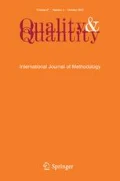Abstract
Generalizability theory explicitly recognizes that multiple sources of error and true score variance exist and that measures may have different reliabilities in different situations. Thus, it enjoys many advantages over classic true score theory; however, it is relatively little used by social science researchers outside of educational psychology. This unfortunate situation has arisen, in part, because researchers do not realize that the coefficients of generalizability, which generalizability theory produces, are reliability coefficients. Labelling these coefficients as reliability coefficients should increase interest in, and the use of, generalizability theory.
Similar content being viewed by others
References
American Psychological Association (1985).Standards for Educational and Psychological Testing. Washington D.C.: American Psychological Association.
Brennan, R. L. (1975). ‘The calculation of reliability from a split-plot factorial design’,Educational and Psychological Measurement 35: 779–788.
Brennan, R. L. (1983).Elements of Generaiizability Theory. Iowa City, Iowa: American College Testing Program.
Cronbach, L. J. (1951). Coefficient alpha and the internal structure of tests.Psychometrika 16: 297–334.
Cronbach, L. J., Gleser, G. C., Harinder, N. and Rajaratnam, N. (1972).The Dependability of Behavioral Measurement: Theory of Generaiizability for Scores and Profiles. New York: Wiley.
Cronbach, L. J., Rajaratnam, N. & Gleser, G. C. (1963). ‘Theory of generalizability: A liberalization of reliability theory’,The British Journal of Statistical Psychology 16: 137–163.
Joreskog, K. G. (1971). ‘Statistical analysis of sets of congeneric tests’,Psychometrika 36: 109–133.
Hoyt, C. (1941). ‘Test reliability estimated by analysis of variance’,Psychometrika 6: 153–160.
Kane, M. T. and Brennan, R. L. (1977). ‘The generalizability of class means’,Review of Educational Research 47: 267–292.
Kuder, G. F. and Richardson, M. W. (1937). ‘The theory of the estimation of test reliability’,Psychometrika 2: 151–160.
Lord, F. M. and Novick, M. R. (1968).Statistical Theories of Mental Test Scores. Reading, Massachusetts: Addison-Wesley.
O'Brien, R. M. (1990). ‘Estimating the reliability of aggregate-level variables based on individual-level characteristics’,Sociological Methods and Research 18: 473–504.
Shavelson, R. J. & Webb, N. M. (1991).Generalizability Theory: A Primer. Newbury Park, CA: Sage.
Thorndike, R. L. (1951). Reliability. In E. F. Lindquist (ed.),Educational Measurement, American Council on Education, pp. 560–620.
Author information
Authors and Affiliations
Rights and permissions
About this article
Cite this article
O'brien, R.M. Generalizability coefficients are reliability coefficients. Qual Quant 29, 421–428 (1995). https://doi.org/10.1007/BF01106066
Issue Date:
DOI: https://doi.org/10.1007/BF01106066




